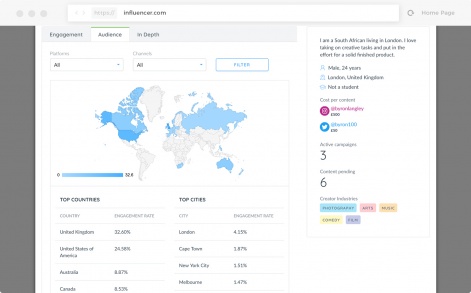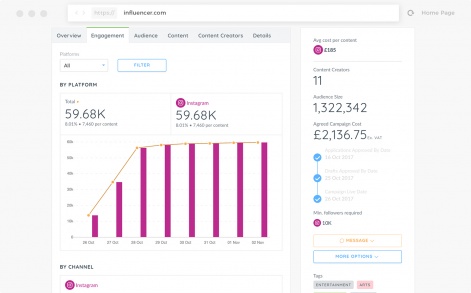As influencer marketing continues to rocket forwards, countless companies have sprouted up in order to capitalise and make their mark on the trend.
Some companies get it right, some are still finding their feet. And some establish dominance by their name alone.
Ben Jeffries founded his company when he was just 16 years old. And with a name like Influencer, it is impossible to ignore. Jeffries was quick to recognise the prowess of digital influence and worked fast to utilise it with his first business, a clothing company called Breeze.
Jeffries, like many other startups, didn't quite have the cash to pay for any big stars. This led to his discovery of micro-influencers, and how smaller wages can result in bigger results.
A couple of years later, Jeffries made the decision to drop out of Bath University and set up Influencer. We had the pleasure of chatting with Jeffries about creating the company, the trends, trials and tribulations of digital marketing, and his grand plans for the future of Influencer as the space continues to evolve.
InfluencerUpdate.biz: What is Influencer and what services do you offer?
Ben Jeffries: Influencer is an influencer marketing technology, with a strategy arm; we offer both a managed and a self-service solution with the ability to use both in parallel.
Our innovative platform offers a fully end-to-end solution to influencer marketing, providing powerful insights and tools for creator discovery, creator relationship management, campaign management and campaign reporting. It’s a CRM system to keep track of your influencer relationships, measure your successes and amplify content at scale to your target audience.
We aim to create meaningful relationships between content creators and brands, using data to align our vetted network of influential content creators with our clients to ensure the audience of the creator reflects the target customer of the brand. The platform’s intuitiveness allows you to run multiple campaigns simultaneously and at scale, whilst also taking care of payments in one place.
Alternatively, our in-house team of expert campaign managers can also provide brands and agencies with campaign strategy and creative ideas, using Influencer’s technology to manage campaigns for them.

When was the company formed, and why?
I founded Influencer in 2015, when I was 16 years old. Influencer was born off the back of my first business, a clothing company called Breeze. I quickly realised that having celebrities wear my clothes was the strongest way of promoting them. However, having very little money, I was unable to afford any serious celebrities.
Instead, I reached out to the Chelsea FC reserve team. These guys had large, dedicated followings, but weren’t expensive. I soon saw the ROI from working with these ‘micro influencers’, and realised that there was a bigger gap in the market for a service that united brands with micro influencers that there was for another streetwear brand! Shortly after, I dropped out of Bath University, and built Influencer.
What do you think are the hottest trends in the influencer space right now?
A trend that we are seeing a huge demand for currently is hyperlocal creators, used by brands who are trying to target smaller, niche, more localised audiences.
These creators tend to be micro creators who typically base much of their content around a local area and attract a local audience. This isn’t to say that these creators won’t appeal to followers from further afield, and brands may use these creators to attract them to the local area.
The localised nature of their content makes them more relatable to their local followers, subsequently increasing the level of trust that followers have in them.
What factors do you consider before deciding to work with an influencer?
We pride ourselves on our vetted network of content creators, which we monitor through both AI technology and manual checks.
Our AI technology provides each creator that signs up to the Influencer platform with a follower credibility rating, established by analysing things like follower trends and engagement metrics, to name a few.
We then review content quality, to ensure that we are only providing our brands with true content creators; people who are producing beautiful, informative and inspiring content. We only work with those creators with the highest follower credibility ratings and quality of content.

It's fair to say that influencer marketing doesn't always get a good rep. What advice would you give to business and brands that are wary of the space?
There are bad tales around all marketing initiatives and new spaces. I would encourage anyone thinking of starting out to make sure they do their research. Understand why the industry is getting a bad rep and think about what you can do to avoid these speed bumps.
This will involve spending some time thinking about your aims, objectives and target audience, and then using this information to choose your creator(s) and social platform(s). I would advise those who remain wary of the space to run their first campaign with the help of an industry expert. Doing so will allow them to learn the steps and form the right patterns initially, so that next time they’ll be ready to go it alone if they decide to.
How do you think the advertising industry has changed with the rise of influencers?
Traditionally, the way advertising worked was to project a brand or product in front of as many eyeballs as possible; the more people saw it, the more likely that it would be relevant to some of them.
Brands are obsessed with reach. Changing our focus to engagement metrics may be the best way to stamp out influencer fraud.
Influencer marketing has changed this completely by allowing brands to project their brand or product directly to their target audience, people who they know are already interested in the product or are likely to be.
Are there problems with the current influencer marketing space that need to be addressed?
I believe that currently, there is a problem with the focus on the responsibility of the content creators when it comes to influencer fraud and ad transparency. Obviously, the creators who are buying followers or not disclosing ads play a huge part, but I also believe that the brands should take some responsibility.
When it comes to influencer fraud, this brand responsibility lies in the obsession that brands seem to have with a creator’s reach. In some instances, they are shunning some of the best content creators, who may have smaller followings, in exchange for creators who have a large following but may not be creating interesting or informative content.
I believe this obsession with reach is definitely encouraging some creators to turn to influencer fraud in order to keep doing their job and that changing our focus to engagement metrics may be the best way to stamp out influencer fraud.
In terms of transparency, a recent study revealed that a third of brands are hesitant to ensure that creators disclose an ad due to a fear that engagement rates will be lower. This is categorically not the case.
Content created in a paid partnership with a brand is often better than an individual’s usual content, as the spend behind it allows the creator to put in increased resources and effort, and as a result of this, the post will often perform better in the algorithm.
What are Influencer’s plans for 2019?
It’s going to be an exciting year for Influencer! We are continuing our mission of ensuring that Influencer is creating meaningful relationships between brands and content creators and bringing relevancy and control back to influencer marketing.
We have just taken Adam Ludwin, co-founder of Captify and founder of Inflecto Media, as a board director. Adam will be working closely alongside my co-founder Caspar Lee and I to ensure that Influencer continues to have the best technology in the market, whilst also planning the start of our international expansion.
We are also continuing to expand our offering to creators. We’ve recently announced the launch of our new creator merchandising solution, Influencer Merch. Influencer Merch is an extension of the Influencer platform, which will allow creators to further connect with their audience and take their brand to the next level through beautifully designed products and merchandise.
And Influencer Merch is just one example of the upcoming features that we are integrating into Influencer’s offering in 2019.













